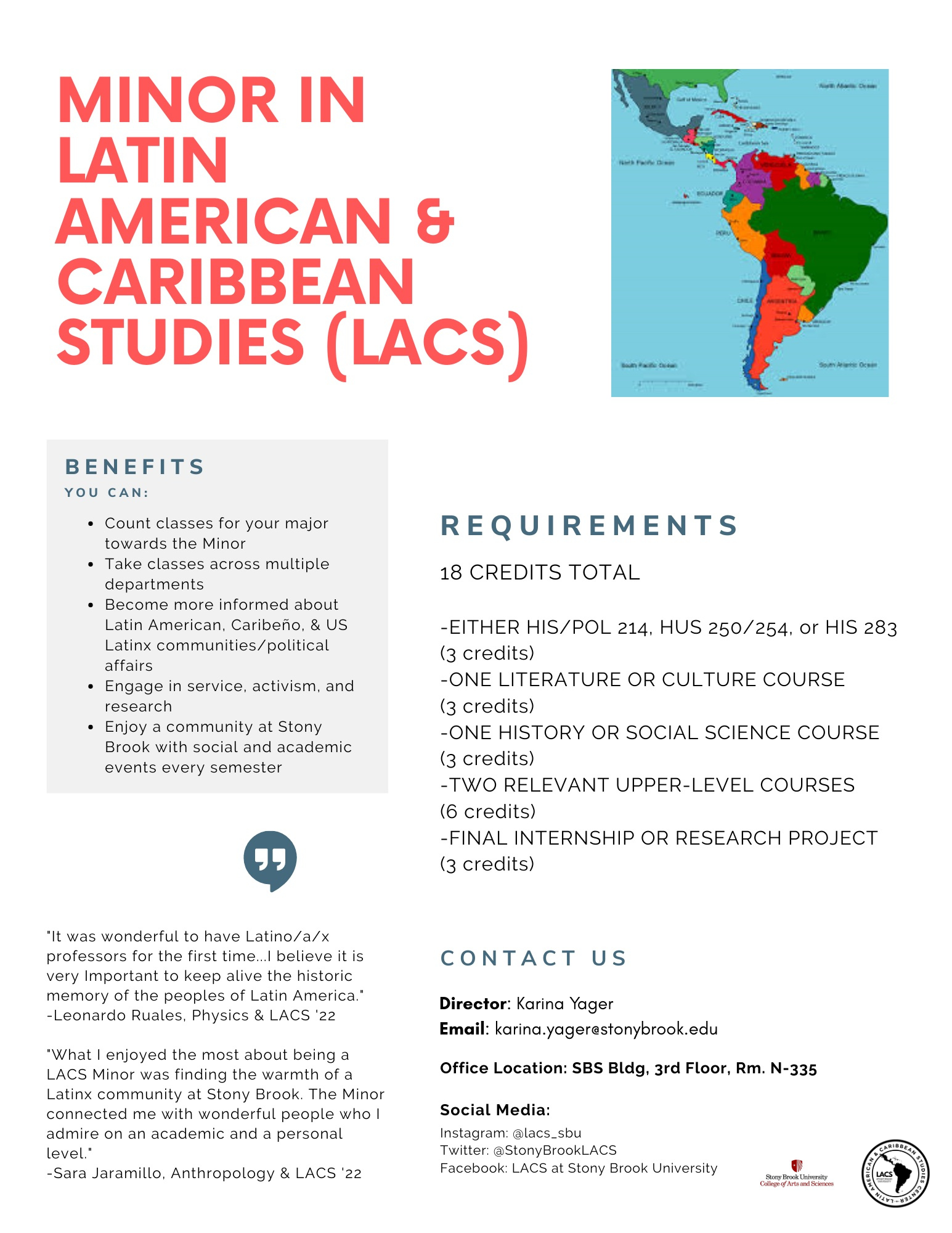Skip Navigation
Search
LACS MINOR & COURSES

The minor in Latin American and Caribbean Studies allows students to pursue an interdisciplinary
course of study that provides a broad overview of Latin America and the Caribbean.
Students are introduced to the principal historical, social, and cultural themes in
the region, and through their electives, they are also able to develop more detailed
knowledge of specific subjects in the region, such as the history of a particular
country or the literature of a particular period
A more detailed guide to our minor can be found here. Please email LACS Director Karina Yager to declare your interest in the minor degree:
karina.yager@stonybrook.edu
FALL '25 COURSES
HISPANIC LANGUAGES & LITERATURE DEPARTMENT
COURSES IN ENGLISH
HUS 150 Indigenous Cultures Latin America
An introduction tthe Indigenous Peoples of Latin America in the past and present times,
focusing on culture, arts, social movements and politics.
Credit(s): 3 SBC: DIV; GLO; HUM LEC 01 MW 02:00-03:20PM JAVITS LECTR 109 TBA
HUS 201 THE Hispanic World Through Visual Cultures
This class will study visual cultural artifacts in close connection to their historical
contexts and to the literary traditions of Latin America, Spain and Hispanic/Latino
USA. The class will survey 500 years of cultural traditions through the analysis of
maps, textiles, pottery, city designs, monumental sculpture, painting, muralism, graffiti,
comic books, visual poetry and other Hispanic visual cultural products.
ADVANCED COURSES IN SPANISH CULTURE
SPN 310 Span Gram & Comp Hisp-Am Bkgrd
Credit(s): 3 SBC: DIV; HFA+; LANG. Prerequisite: fluency in Spanish equivalent to
SPN 212
SPN 311 Spanish Conversatn & Compositn
Credit(s): 3 SBC: DIV; HFA+; LANG
Prerequisite: SPN 212 or placement into 311 (LVL5).
SPN 321 Adv Spanish Grammar & Compostn
Credit(s): 3 SBC: CER; HFA+; WRTD. Prerequisite: SPN 310 or SPN 311
LATIN AMERICAN LITERATURE & CULTURE TAUGHT IN SPANISH
SPN 384 Intro Latin American Lit I/Cul (Cultures and texts from the colonial period)
The study of culture, society, art and literature of Latin America in global context
from its native origins through colonial rule. Formerly offered as SPN 395; not for
credit in addition to SPN 395.
SPN 410 Theory in Contexts .TOPIC: NAVIGATING THE BORDER
Credit(s): 3 SBC: ESI; HFA+ . Prerequisite: SPN 384 or SPN 385 or SPN 386 or SPN 387
or SPN 388 or SPN 389
Text analysis as they relate to Spanish or Latin American political, social, and
gender relations and institutions. Sample topics include gender and representation, the body, popular and media cultures, the picaresque, visual and performance
studies. May be repeated as the topic changes
gender relations and institutions. Sample topics include gender and representation, the body, popular and media cultures, the picaresque, visual and performance
studies. May be repeated as the topic changes
PORTUGUESE
POR 111 - Elementary Portuguese I
POR 411/511 - Portuguese for Spanish Speakers
HISTORY DEPARTMENT
HIS 542 Modern Latin American History Seminar
Field seminar in modern Latin American history. Surveys major historical problems
and debates from the post-independence period to the present. This course is offered
as both CEG 517 and HIS 542.
Note: Basic background in Latin American history and culture recommended.
